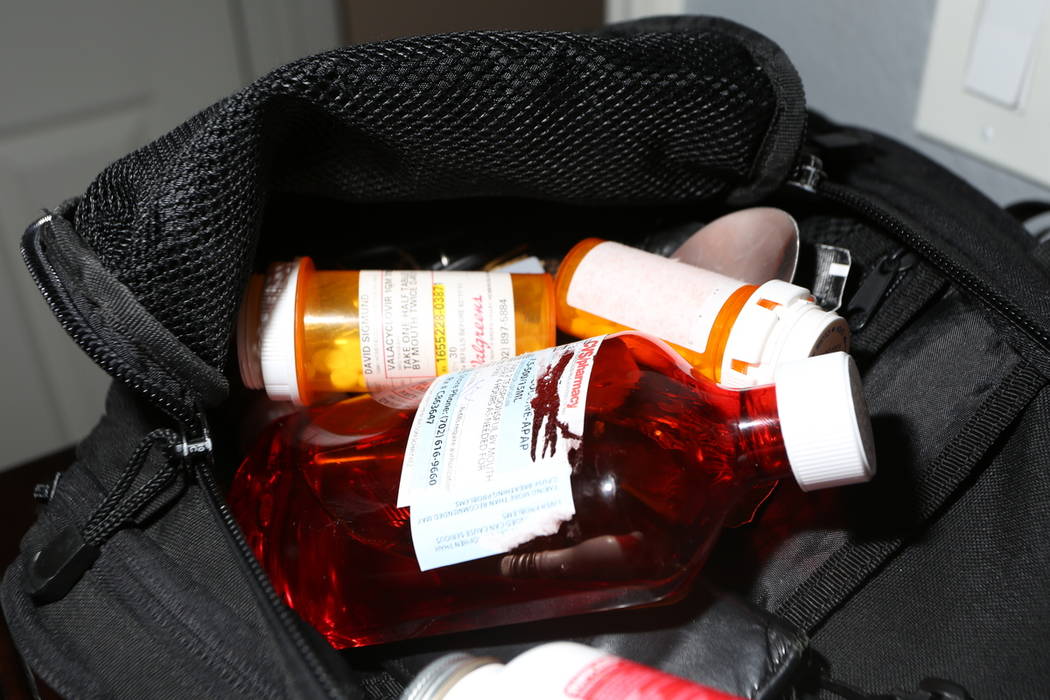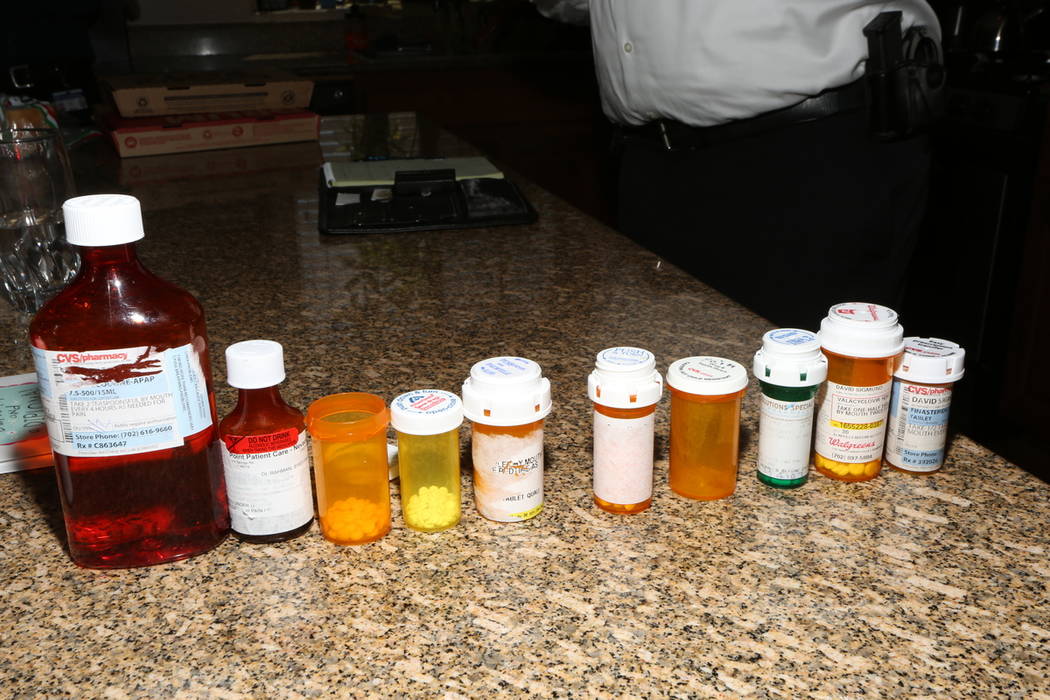Henderson cop’s overdose death not investigated by internal affairs — VIDEO
Henderson police internal affairs failed to investigate the 2014 accidental prescription-narcotics overdose death of one of its officers even though part of his job was to collect and dispose of expired drugs dropped off by residents, a Review-Journal investigation found.
Though a backpack full of narcotics was found in the officer’s bedroom, internal affairs officers did not attempt to determine where the drugs that killed him came from, records and interviews show. Nor did police investigate if any other officers were involved despite department regulations that required two officers to pick up and dispose of the drugs to thwart diversions.
Patrick Moers, who was Henderson’s police chief at the time, said Officer David Sigmund’s death was ruled accidental so there was no need for an internal affairs investigation.
“The guy was a good officer who tragically overdosed and there’s nothing criminal about the situation,” he said.
But Kenneth Harms, the former police chief for Miami, said police administrators should have determined how Sigmund obtained the drugs and if anyone else was involved.
“A criminal investigation and internal affairs are two different things,” he said. “IA needs to take a look at the conduct of the individuals and whether they met the prescribed rules and regulations, and in my view an investigation should have been done.
“I’m sure it was because they wanted to get it out of the paper because it’s very embarrassing to the department,” he added.
Media reports at the time said that Sigmund died of unknown natural causes. This is the first time that his overdose death and the failure of police to investigate has been disclosed to the public.
Current Henderson police administration officials did not respond to repeated requests for comment on Sigmund’s death and the police department’s failure to investigate the circumstances around the overdose. Lt. Kirk L. Moore, of the public affairs unit, confirmed Monday that there was no internal affairs investigation and wrote: “There are no additional details regarding this incident.”
Mayor Debra March declined comment through a spokeswoman.
“She’s not privy to something that happened five years ago and it’s outside the mayor’s purview,” said city spokeswoman Kathleen Richards.
Drug death
On the morning of June 9, 2014, Sigmund’s wife, called 911 to report that she couldn’t wake her 33-year-old husband, police reports and interviews show. He was cold to the touch and had no pulse.
Paramedics took Sigmund to a local hospital where he was pronounced dead. Henderson detectives found pill containers and drug bottles, several with defaced labels, in Sigmund’s work backpack, police records show.
“The decedent was involved with the HPD community prescription medication impound program,” said the Clark County Coroner’s report of investigation. The program gathered prescription drugs that were expired or no longer needed and incinerated them in the animal shelter’s furnace.
The drugs found in Sigmund’s home included a bottle of liquid hydrocodone prescribed by Dr. Matthew Schwartz of Comprehensive Cancer Centers of Nevada and a bottle of morphine prescribed by Henderson Dr. Syed Rahman, police reports show. “It appears this prescription originated from a hospice,” the report said.
There were also bottles of hydrocodone pills and Lorazepam, an anti-anxiety medicine, found in Sigmund’s work backpack whose labels were completely torn off, reports show.
The defaced labels make it impossible to determine who the medications were prescribed to, but an assistant in Rahman’s office told the Review-Journal that he could not find Sigmund listed as a patient in their computer system. Radiation oncologist Schwartz, who prescribed the liquid hydrocodone, did not return a call seeking comment.
The Clark County coroner determined Sigmund died of “Acute Morphine, Hydrocodone, and Lorazepam Toxicity” and ruled the death accidental.
Sigmund’s wife told police that he had no medical problems and was prescribed drugs only for hair loss, a recording of her interview with police shows. He had seen a doctor for back pain, but she didn’t know if he received medication. She could not be reached for comment.
Fellow officers who were close to Sigmund said he had recently stopped drinking, lost weight and they do not believe he used or abused prescription medication, according to the police report. One officer named in the report could not be reached for comment, and the other hung up when asked questions about the case.
Police did not ask Sigmund’s wife if she knew where her husband obtained the narcotics and sedatives that investigators found in his work backpack, the recording shows.
Strict protocols
Las Vegas attorney E. Matthew Zobrist, who was a patrol sergeant in Henderson at the time of Sigmund’s death and had previously served in the Henderson police community relations that organized the prescription drops, said he had not heard that Sigmund possessed drugs that were not prescribed to him.
“I have a hard time believing he would take drugs he was not authorized to take,” Zobrist said. “He didn’t even like taking drugs that were prescribed to him.”
Zobrist said there were strict protocols in the pickup and disposal of expired drugs in the prescription impound program.
“We were working with the drug drop and made sure there was a tight chain of custody,” he said. “It was very controlled with check-in and check-out weighing and upon arrival (at the incinerator). It was double verified.”
Moers said there are daily overdoses in Henderson and there is no reason to investigate a police officer’s death particularly if authorities don’t look into the other accidental drug fatalities.
“We don’t investigate when people accidentally overdose, and we don’t look for where those drugs came from,” he said.
But Robert Verry, a former police chief in New Jersey who started New Jersey’s Internal Affairs Association and wrote a book about IA investigations, said it is the best practice to investigate all incidents if police don’t know whether drugs were diverted or if other officers were involved.
Police need to conduct “an internal affairs investigation to determine if there’s something with the policy or the procedure that went wrong,” he said.
More than three years after Sigmund’s death, the department ended the prescription drop box program, according to directives obtained under state open records laws. It is unclear whether the change was related to Sigmund’s death.
Contact Arthur Kane at akane@reviewjournal.com. Follow @ArthurMKane on Twitter.



















